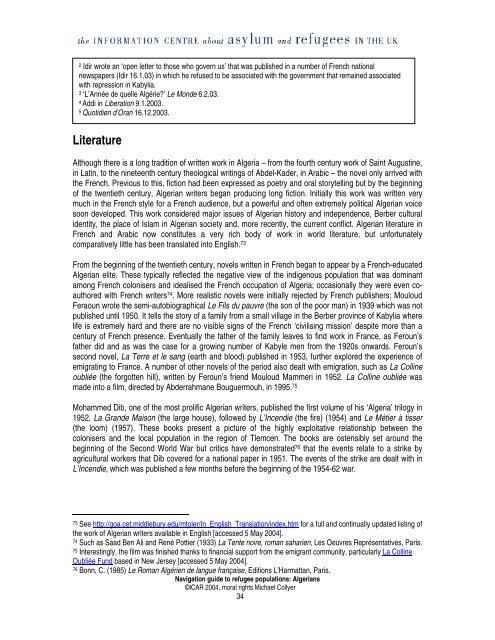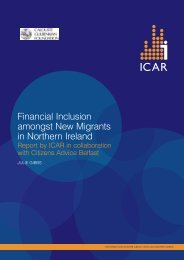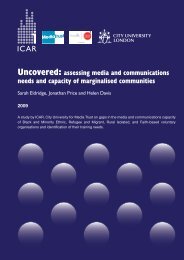Navigation guide Refugee populations in the UK: Algerians - ICAR
Navigation guide Refugee populations in the UK: Algerians - ICAR
Navigation guide Refugee populations in the UK: Algerians - ICAR
You also want an ePaper? Increase the reach of your titles
YUMPU automatically turns print PDFs into web optimized ePapers that Google loves.
2 Idir wrote an ‘open letter to those who govern us’ that was published <strong>in</strong> a number of French national<br />
newspapers (Idir 16.1.03) <strong>in</strong> which he refused to be associated with <strong>the</strong> government that rema<strong>in</strong>ed associated<br />
with repression <strong>in</strong> Kabylia.<br />
3 ‘L’Année de quelle Algérie’ Le Monde 6.2.03.<br />
4 Addi <strong>in</strong> Liberation 9.1.2003.<br />
5 Quotidien d’Oran 16.12.2003.<br />
Literature<br />
Although <strong>the</strong>re is a long tradition of written work <strong>in</strong> Algeria – from <strong>the</strong> fourth century work of Sa<strong>in</strong>t August<strong>in</strong>e,<br />
<strong>in</strong> Lat<strong>in</strong>, to <strong>the</strong> n<strong>in</strong>eteenth century <strong>the</strong>ological writ<strong>in</strong>gs of Abdel-Kader, <strong>in</strong> Arabic – <strong>the</strong> novel only arrived with<br />
<strong>the</strong> French. Previous to this, fiction had been expressed as poetry and oral storytell<strong>in</strong>g but by <strong>the</strong> beg<strong>in</strong>n<strong>in</strong>g<br />
of <strong>the</strong> twentieth century, Algerian writers began produc<strong>in</strong>g long fiction. Initially this work was written very<br />
much <strong>in</strong> <strong>the</strong> French style for a French audience, but a powerful and often extremely political Algerian voice<br />
soon developed. This work considered major issues of Algerian history and <strong>in</strong>dependence, Berber cultural<br />
identity, <strong>the</strong> place of Islam <strong>in</strong> Algerian society and, more recently, <strong>the</strong> current conflict. Algerian literature <strong>in</strong><br />
French and Arabic now constitutes a very rich body of work <strong>in</strong> world literature, but unfortunately<br />
comparatively little has been translated <strong>in</strong>to English. 73<br />
From <strong>the</strong> beg<strong>in</strong>n<strong>in</strong>g of <strong>the</strong> twentieth century, novels written <strong>in</strong> French began to appear by a French-educated<br />
Algerian elite. These typically reflected <strong>the</strong> negative view of <strong>the</strong> <strong>in</strong>digenous population that was dom<strong>in</strong>ant<br />
among French colonisers and idealised <strong>the</strong> French occupation of Algeria; occasionally <strong>the</strong>y were even coauthored<br />
with French writers 74 . More realistic novels were <strong>in</strong>itially rejected by French publishers; Mouloud<br />
Feraoun wrote <strong>the</strong> semi-autobiographical Le Fils du pauvre (<strong>the</strong> son of <strong>the</strong> poor man) <strong>in</strong> 1939 which was not<br />
published until 1950. It tells <strong>the</strong> story of a family from a small village <strong>in</strong> <strong>the</strong> Berber prov<strong>in</strong>ce of Kabylia where<br />
life is extremely hard and <strong>the</strong>re are no visible signs of <strong>the</strong> French ‘civilis<strong>in</strong>g mission’ despite more than a<br />
century of French presence. Eventually <strong>the</strong> fa<strong>the</strong>r of <strong>the</strong> family leaves to f<strong>in</strong>d work <strong>in</strong> France, as Feroun’s<br />
fa<strong>the</strong>r did and as was <strong>the</strong> case for a grow<strong>in</strong>g number of Kabyle men from <strong>the</strong> 1920s onwards. Feroun’s<br />
second novel, La Terre et le sang (earth and blood) published <strong>in</strong> 1953, fur<strong>the</strong>r explored <strong>the</strong> experience of<br />
emigrat<strong>in</strong>g to France. A number of o<strong>the</strong>r novels of <strong>the</strong> period also dealt with emigration, such as La Coll<strong>in</strong>e<br />
oubliée (<strong>the</strong> forgotten hill), written by Feroun’s friend Mouloud Mammeri <strong>in</strong> 1952. La Coll<strong>in</strong>e oubliée was<br />
made <strong>in</strong>to a film, directed by Abderrahmane Bouguermouh, <strong>in</strong> 1995. 75<br />
Mohammed Dib, one of <strong>the</strong> most prolific Algerian writers, published <strong>the</strong> first volume of his ‘Algeria’ trilogy <strong>in</strong><br />
1952, La Grande Maison (<strong>the</strong> large house), followed by L’Incendie (<strong>the</strong> fire) (1954) and Le Métier à tisser<br />
(<strong>the</strong> loom) (1957). These books present a picture of <strong>the</strong> highly exploitative relationship between <strong>the</strong><br />
colonisers and <strong>the</strong> local population <strong>in</strong> <strong>the</strong> region of Tlemcen. The books are ostensibly set around <strong>the</strong><br />
beg<strong>in</strong>n<strong>in</strong>g of <strong>the</strong> Second World War but critics have demonstrated 76 that <strong>the</strong> events relate to a strike by<br />
agricultural workers that Dib covered for a national paper <strong>in</strong> 1951. The events of <strong>the</strong> strike are dealt with <strong>in</strong><br />
L’Incendie, which was published a few months before <strong>the</strong> beg<strong>in</strong>n<strong>in</strong>g of <strong>the</strong> 1954-62 war.<br />
73 See http://goa.cet.middlebury.edu/mtoler/In_English_Translation/<strong>in</strong>dex.htm for a full and cont<strong>in</strong>ually updated list<strong>in</strong>g of<br />
<strong>the</strong> work of Algerian writers available <strong>in</strong> English [accessed 5 May 2004].<br />
74 Such as Saad Ben Ali and René Pottier (1933) La Tente noire, roman saharien, Les Oeuvres Représentatives, Paris.<br />
75 Interest<strong>in</strong>gly, <strong>the</strong> film was f<strong>in</strong>ished thanks to f<strong>in</strong>ancial support from <strong>the</strong> emigrant community, particularly La Coll<strong>in</strong>e<br />
Oubliée Fund based <strong>in</strong> New Jersey [accessed 5 May 2004].<br />
76 Bonn, C. (1985) Le Roman Algérien de langue française, Editions L’Harmattan, Paris.<br />
<strong>Navigation</strong> <strong>guide</strong> to refugee <strong>populations</strong>: <strong>Algerians</strong><br />
©<strong>ICAR</strong> 2004, moral rights Michael Collyer<br />
34

















